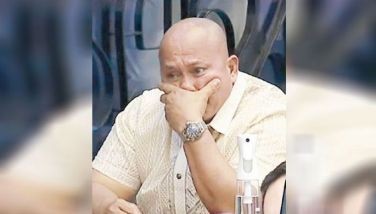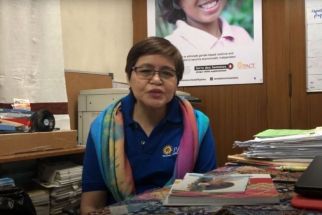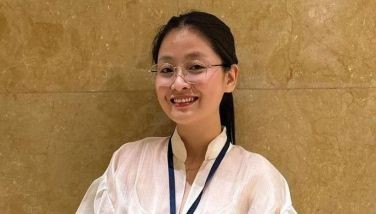ARMM mourns Dimaporo’s death
April 22, 2004 | 12:00am
COTABATO CITY — Veteran Muslim politician Mohammad Ali Dimaporo died of old age at the Philippine Heart Center in Quezon City at dawn yesterday.
Muslim communities across Mindanao, where Dimaporo was one of the most feared warlords, mourned his death.
Because he had no birth certificate, Dimaporo was estimated to be in his mid-90s.
The Autonomous Region in Muslim Mindanao (ARMM) will observe a week-long mourning period to give "courtesy, respect and recognition" to Dimaporo.
"He may be gone but his works and sacrifices for the Maranao people and Muslims in other parts of the ARMM will be remembered as a legacy," Gov. Parouk Hussin said in a statement.
After fighting the Japanese as a guerrilla leader during World War II, Dimaporo emerged as one of Mindanao’s most powerful politicians.
He became a provincial governor, congressman, university president and ally of the late dictator Ferdinand Marcos.
According to G. Carter Bentley, a specialist in Marawi politics, the "three G’s of Philippine politics, guns, goons and gold, swirl around him with manic abandon."
"In many ways, he is an anomaly. He is a Muslim who reached the highest levels of power within the Philippine government while the Muslim minority and that government were at war," Bentley wrote in "An Anarchy of Families," a book on the Philippines’ political dynasties.
"He is a man of relatively modest origins who attained an extremely high position among the Maranao hereditary nobility. Many find him outrageous, even laughable, but he commands respect because, in the desperately competitive world of Maranao (and of Philippine) politics, he wins. His was a political dynasty only one generation deep, but he is already laying the groundwork to extend it into the future."
Dimaporo’s remains will be brought back today for burial in his hometown of Binidayan, Lanao del Sur via the Cagayan de Oro airport. On hand will be his family and close relatives led by his son Rep. Abdullah Dimaporo of the second district of Lanao del Norte and wife, Gov. Imelda Dimaporo, and cousin Motalib Dimaporo, mayor of Sultan Naga Dimaporo town.
The more than 500-vehicle convoy will escort the remains to his hometown where the body will be buried before sunset today in accordance with Muslim tradition.
The eldest of eight children, Dimaporo was born on June 15, 1918, to Datu Dimaporo Marahom and Potri-Maamor Borngao Marahom in Binidayan, a small town south of Lake Lanao in Lanao del Sur. His father was the sultan of Binidayan but the title later went to a cousin.
But it was Dimaporo’s grandparents who largely raised him.
After graduating from high school in Dansalan in 1938, he took up law at the University of the Philippines. During his second year there, a star student was arrested for murder while preparing for the Bar.
That student’s impassioned defense before the Supreme Court that led to his acquittal captured the imagination of the nation and his fellow law students, including Dimaporo.
That student was Ferdinand Marcos, of whom Dimaporo would later become a staunch political ally.
World War II broke out and Dimaporo was drafted into the Philippine Army. After the surrender of US forces in the Philippines, Dimaporo was interned in May 1942 in a prisoner-of-war camp.
He was released in July after promising the Japanese occupiers that he would help pacify the Maranao populace. While Dimaporo helped in the pacification, he secretly aided guerrillas, providing weapons and supplies.
In June 1944 — four months before US forces landed in Leyte — Dimaporo led a guerrilla force and openly resisted the Japanese in a war of hit-and-run until US troops arrived in the province in 1945. By then, the whole place was in guerrilla hands.
Dimaporo entered the political arena after World War II. "Wartime service in the resistance helped further many political careers in the postwar period," Bentley wrote.
Following Philippine independence in 1946, Dimaporo was part of the wave of Muslims being brought into the electoral process for the first time when national party leaders were seeking prospective Muslim candidates.
Dimaporo joined the Liberal Party and was elected congressman, representing Lanao, which was then a single province.
In 1953, Dimaporo ran for re-election but lost. He claimed that the military in the province — which was loyal to then defense secretary Ramon Magsaysay, the Nacionalista Party’s presidential candidate — interfered in the polls.
Dimaporo protested the election results and was later declared winner by the House Electoral Tribunal — but with only six months left in his term.
In 1957, he lost again and Dimaporo retired to his farms in Karomatan, intending to make money by growing cassava.
But the political landscape changed dramatically in 1959 when the province was divided into predominantly Muslim Lanao del Sur and predominantly Christian Lanao del Norte.
In the local elections that year, Dimaporo ran for governor of Lanao del Norte under the LP banner but he was not expected to win.
Dimaporo had several factors going against him.
He was up against the province’s powerful Lluch clan. "Only two of the 19 municipal mayors endorsed him. He lacked the degree of descent rank that would have solidified a Maranao following, and he was not politically wealthy," Bentley wrote.
Dimaporo said he decided not to run in Lanao del Sur because that meant going up against the Alonto-Lucman clan, which had "complete political hegemony" there.
However, the Lluch clan had made many important enemies including a few powerful families, with whom Dimaporo drew support. He won by a mere 275 votes.
"In this and subsequent elections, Dimaporo displayed his acumen as a political organizer, his almost uncanny ability to turn an apparent weak position into a winning one," according to Bentley.
Dimaporo ran for Congress in the 1965 general elections, still with the LP. It was the year he would seal his ties with Ferdinand Marcos.
Being a loyal party member, he supported the incumbent President Diosdado Macapagal, President Arroyo’s father.
But he actually wanted Marcos, who had jumped ship and joined the Nacionalista Party, to win.
During Marcos’ visit to Iligan City, Dimaporo’s wife went into labor and Marcos went with him to the hospital, and Dimaporo named his son Ferdinand Marcos Dimaporo.
He earned Marcos’ favor later by reportedly refusing petitions from LP emissaries to rig the vote and make it appear that Macapagal won overwhelmingly in the province. Marcos won by a sizable margin as a result.
In 1966, Dimaporo solidified his ties with Marcos when news broke that military officers had liquidated several dozen Muslim recruits into a secret army unit.
The so-called "Jabidah Massacre" galvanized Muslim opposition against the government but Dimaporo — almost alone among Muslim leaders — stood by Marcos.
"In this crisis, Dimaporo’s willingness to subordinate his Muslim identity to personal and party loyalty earned him Marcos’s gratitude," Bentley wrote.
In 1969, Dimaporo was re-elected. By then, the hotly contested polls unveiled signs of sectarian violence in the Lanao provinces, with rival politicians, including Dimaporo, maintaining private armies.
Dimaporo reportedly kept a 300-strong force, nicknamed the "Barracudas." Malacañang was alarmed because the violence could ignite a sectarian war engulfing Mindanao.
In 1976, the height of martial law, Marcos appointed Dimaporo provincial governor of Lanao del Sur, giving him what he could not win in elections.
A few months later he was made president of Mindanao State University, whose budget was bloated and money went allegedly to his pockets. Dimaporo left MSU in 1986 after the fall of the Marcos dictatorship and was replaced as governor by the new Corazon Aquino administration.
Despite his warlord image, Dimaporo "seemed to have come through the trauma of Marcos’s fall remarkably unscathed," Bentley said.
"According to Maranao standards, his behavior tends to be coarse, more typical of a commoner than of the aristocrat he claims to be," Bentley wrote. "But he has repeatedly shown a subtlety in political maneuvering unmatched in the fiercely competitive arena of Maranao politics." — With Lino dela Cruz
Muslim communities across Mindanao, where Dimaporo was one of the most feared warlords, mourned his death.
Because he had no birth certificate, Dimaporo was estimated to be in his mid-90s.
The Autonomous Region in Muslim Mindanao (ARMM) will observe a week-long mourning period to give "courtesy, respect and recognition" to Dimaporo.
"He may be gone but his works and sacrifices for the Maranao people and Muslims in other parts of the ARMM will be remembered as a legacy," Gov. Parouk Hussin said in a statement.
After fighting the Japanese as a guerrilla leader during World War II, Dimaporo emerged as one of Mindanao’s most powerful politicians.
He became a provincial governor, congressman, university president and ally of the late dictator Ferdinand Marcos.
According to G. Carter Bentley, a specialist in Marawi politics, the "three G’s of Philippine politics, guns, goons and gold, swirl around him with manic abandon."
"In many ways, he is an anomaly. He is a Muslim who reached the highest levels of power within the Philippine government while the Muslim minority and that government were at war," Bentley wrote in "An Anarchy of Families," a book on the Philippines’ political dynasties.
"He is a man of relatively modest origins who attained an extremely high position among the Maranao hereditary nobility. Many find him outrageous, even laughable, but he commands respect because, in the desperately competitive world of Maranao (and of Philippine) politics, he wins. His was a political dynasty only one generation deep, but he is already laying the groundwork to extend it into the future."
Dimaporo’s remains will be brought back today for burial in his hometown of Binidayan, Lanao del Sur via the Cagayan de Oro airport. On hand will be his family and close relatives led by his son Rep. Abdullah Dimaporo of the second district of Lanao del Norte and wife, Gov. Imelda Dimaporo, and cousin Motalib Dimaporo, mayor of Sultan Naga Dimaporo town.
The more than 500-vehicle convoy will escort the remains to his hometown where the body will be buried before sunset today in accordance with Muslim tradition.
The eldest of eight children, Dimaporo was born on June 15, 1918, to Datu Dimaporo Marahom and Potri-Maamor Borngao Marahom in Binidayan, a small town south of Lake Lanao in Lanao del Sur. His father was the sultan of Binidayan but the title later went to a cousin.
But it was Dimaporo’s grandparents who largely raised him.
After graduating from high school in Dansalan in 1938, he took up law at the University of the Philippines. During his second year there, a star student was arrested for murder while preparing for the Bar.
That student’s impassioned defense before the Supreme Court that led to his acquittal captured the imagination of the nation and his fellow law students, including Dimaporo.
That student was Ferdinand Marcos, of whom Dimaporo would later become a staunch political ally.
World War II broke out and Dimaporo was drafted into the Philippine Army. After the surrender of US forces in the Philippines, Dimaporo was interned in May 1942 in a prisoner-of-war camp.
He was released in July after promising the Japanese occupiers that he would help pacify the Maranao populace. While Dimaporo helped in the pacification, he secretly aided guerrillas, providing weapons and supplies.
In June 1944 — four months before US forces landed in Leyte — Dimaporo led a guerrilla force and openly resisted the Japanese in a war of hit-and-run until US troops arrived in the province in 1945. By then, the whole place was in guerrilla hands.
Dimaporo entered the political arena after World War II. "Wartime service in the resistance helped further many political careers in the postwar period," Bentley wrote.
Following Philippine independence in 1946, Dimaporo was part of the wave of Muslims being brought into the electoral process for the first time when national party leaders were seeking prospective Muslim candidates.
Dimaporo joined the Liberal Party and was elected congressman, representing Lanao, which was then a single province.
In 1953, Dimaporo ran for re-election but lost. He claimed that the military in the province — which was loyal to then defense secretary Ramon Magsaysay, the Nacionalista Party’s presidential candidate — interfered in the polls.
Dimaporo protested the election results and was later declared winner by the House Electoral Tribunal — but with only six months left in his term.
In 1957, he lost again and Dimaporo retired to his farms in Karomatan, intending to make money by growing cassava.
But the political landscape changed dramatically in 1959 when the province was divided into predominantly Muslim Lanao del Sur and predominantly Christian Lanao del Norte.
In the local elections that year, Dimaporo ran for governor of Lanao del Norte under the LP banner but he was not expected to win.
Dimaporo had several factors going against him.
He was up against the province’s powerful Lluch clan. "Only two of the 19 municipal mayors endorsed him. He lacked the degree of descent rank that would have solidified a Maranao following, and he was not politically wealthy," Bentley wrote.
Dimaporo said he decided not to run in Lanao del Sur because that meant going up against the Alonto-Lucman clan, which had "complete political hegemony" there.
However, the Lluch clan had made many important enemies including a few powerful families, with whom Dimaporo drew support. He won by a mere 275 votes.
"In this and subsequent elections, Dimaporo displayed his acumen as a political organizer, his almost uncanny ability to turn an apparent weak position into a winning one," according to Bentley.
Being a loyal party member, he supported the incumbent President Diosdado Macapagal, President Arroyo’s father.
But he actually wanted Marcos, who had jumped ship and joined the Nacionalista Party, to win.
During Marcos’ visit to Iligan City, Dimaporo’s wife went into labor and Marcos went with him to the hospital, and Dimaporo named his son Ferdinand Marcos Dimaporo.
He earned Marcos’ favor later by reportedly refusing petitions from LP emissaries to rig the vote and make it appear that Macapagal won overwhelmingly in the province. Marcos won by a sizable margin as a result.
In 1966, Dimaporo solidified his ties with Marcos when news broke that military officers had liquidated several dozen Muslim recruits into a secret army unit.
The so-called "Jabidah Massacre" galvanized Muslim opposition against the government but Dimaporo — almost alone among Muslim leaders — stood by Marcos.
"In this crisis, Dimaporo’s willingness to subordinate his Muslim identity to personal and party loyalty earned him Marcos’s gratitude," Bentley wrote.
In 1969, Dimaporo was re-elected. By then, the hotly contested polls unveiled signs of sectarian violence in the Lanao provinces, with rival politicians, including Dimaporo, maintaining private armies.
Dimaporo reportedly kept a 300-strong force, nicknamed the "Barracudas." Malacañang was alarmed because the violence could ignite a sectarian war engulfing Mindanao.
In 1976, the height of martial law, Marcos appointed Dimaporo provincial governor of Lanao del Sur, giving him what he could not win in elections.
A few months later he was made president of Mindanao State University, whose budget was bloated and money went allegedly to his pockets. Dimaporo left MSU in 1986 after the fall of the Marcos dictatorship and was replaced as governor by the new Corazon Aquino administration.
Despite his warlord image, Dimaporo "seemed to have come through the trauma of Marcos’s fall remarkably unscathed," Bentley said.
"According to Maranao standards, his behavior tends to be coarse, more typical of a commoner than of the aristocrat he claims to be," Bentley wrote. "But he has repeatedly shown a subtlety in political maneuvering unmatched in the fiercely competitive arena of Maranao politics." — With Lino dela Cruz
BrandSpace Articles
<
>
- Latest
- Trending
Trending
Latest
Trending
Latest
Recommended



























